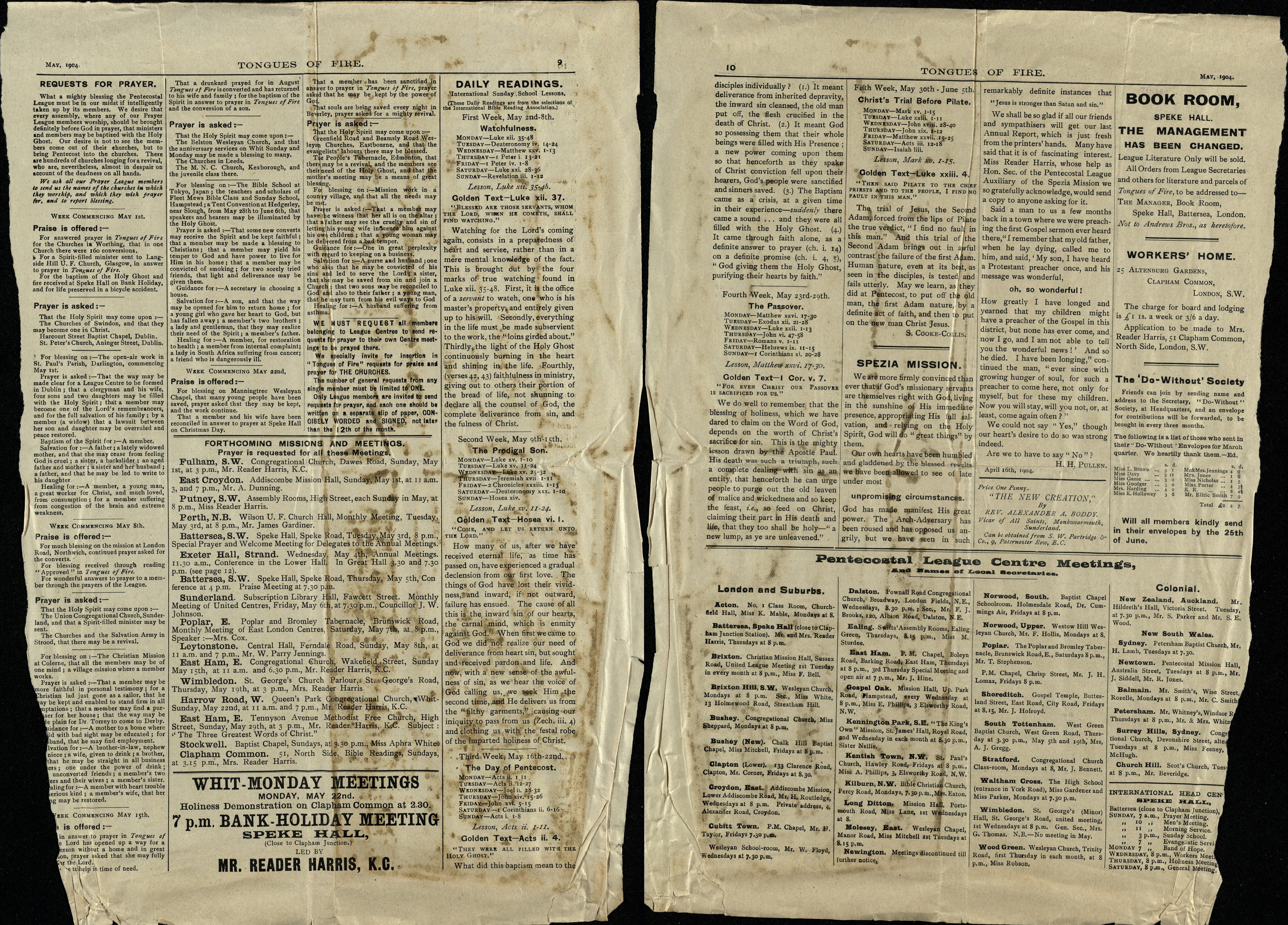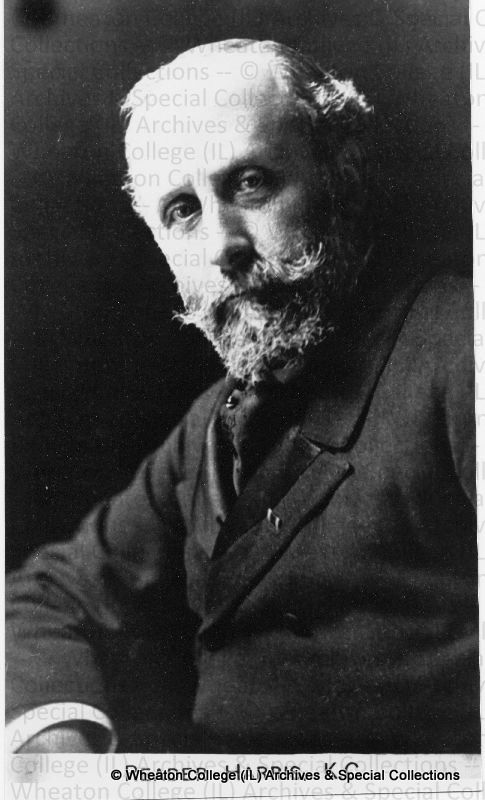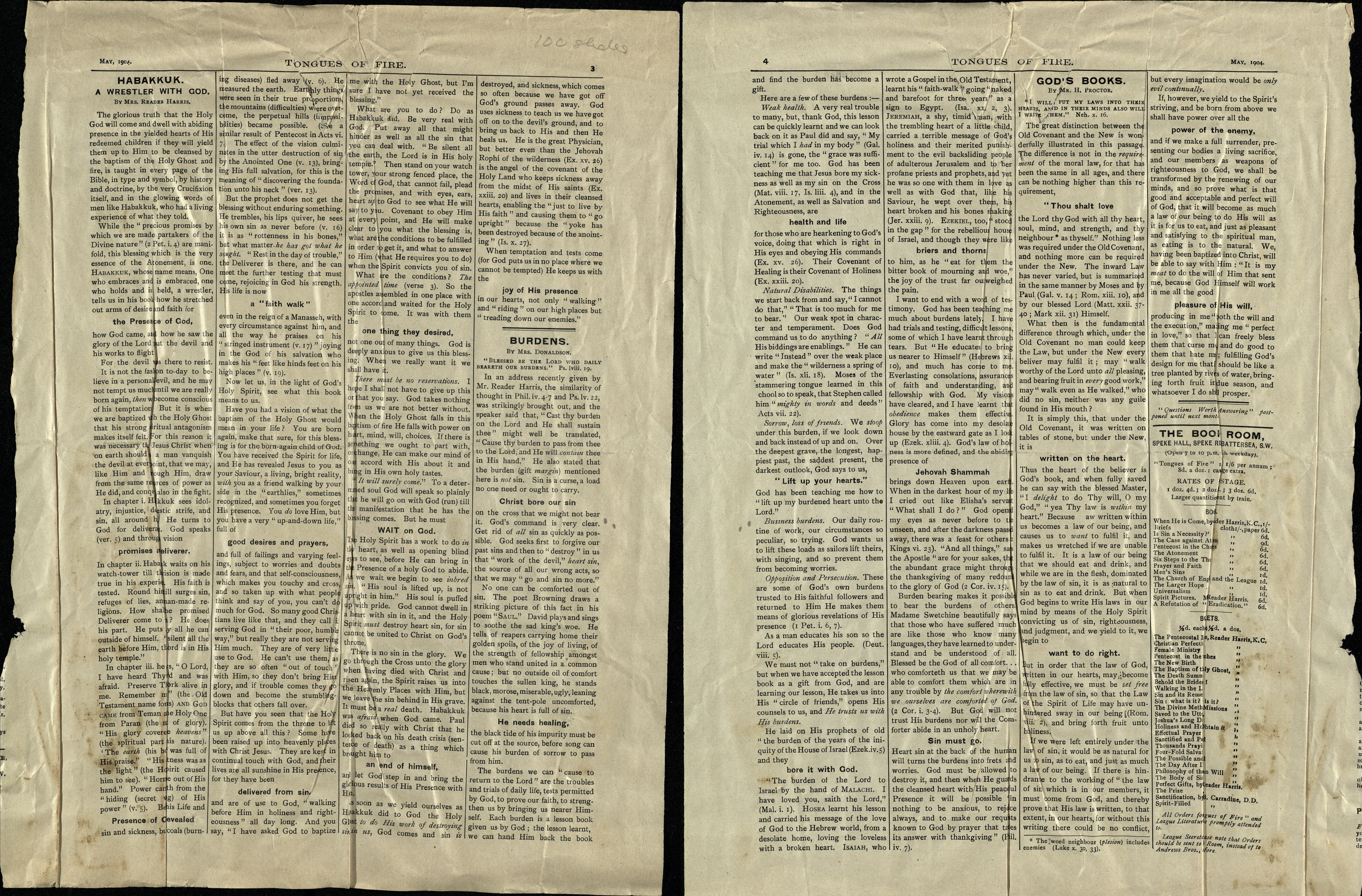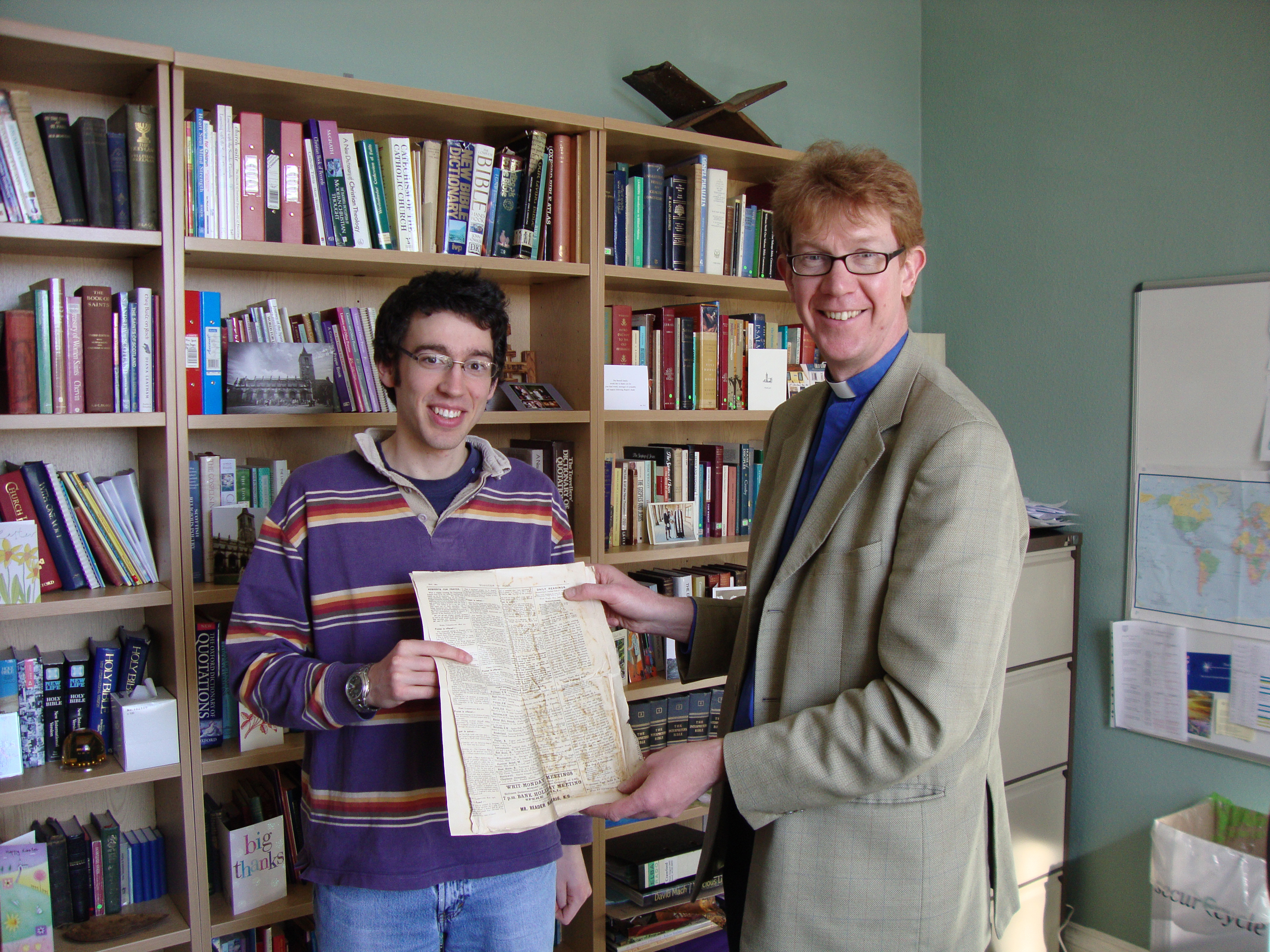Tongues of Fire: newspapers returned to family home
The pages were yellowed and slightly crumpled. “Thought you’d find these interesting,” said my wife who is Maia Sheridan, Manuscripts Archivist. “They were lining a box containing lantern slides belonging to Edward J Balfour who taught chemistry here. We don’t need to keep them in the collection so I thought you might like them.” What she showed me were two leaves from a 1904 edition of Tongues of Fire, a broadsheet newspaper. The paper, on closer inspection, turned out to be published by the Pentecostal League of Prayer, an organisation which held gospel meetings throughout London and a few places elsewhere, sold books and pamphlets, encouraged prayer for conversions and for increasing holiness in the life of the Christian. A name is particularly prominent in the pages: Reader Harris. Mr Reader Harris was to speak at a number of events, and his books were for sale; a sermon by Mrs Reader Harris was printed; and a Miss Reader Harris would also be speaking at a future meeting.

What piqued my curiosity was that I know a certain Peter Reader-Harris, the most recent President of the University’s Christian Union, an organisation promoting worship, Bible-study and Christian mission among students. Peter is in his second year of a PhD in Physics. When I asked Peter if he was at all connected to Reader Harris of Tongues of Fire, he told me he is directly descended: Peter is the great-great grandson of Reader Harris. Peter was able to provide some background to Tongues of Fire.

Reader Harris (Reader appears to be his Christian name, though occasionally he seems to go by the name Richard Reader Harris) was born in 1847. His father was Chief Constable of Worcestershire. The younger Reader Harris became an engineering apprentice on the railways, but was desperate to travel, keeping a bag packed ready to leave immediately if need be. His chance came when Bolivia required a young engineer to develop their railways, and he spent a year there. On returning to Great Britain, he trained as a lawyer, was called to Gray’s Inn and took silk. In his spiritual journey, he had become an agnostic. However he was increasingly influenced by Christian literature, and was converted in 1884. The moment of his conversion happened, appropriately enough, on a train. He was travelling west through London, and heard the station announcement “Ealing! Ealing! Ealing!” as “Healing! Healing! Healing!” He desired that healing, committed himself to Christ, and missed his stop.
With his wife, Mary Griffin Bristow, he founded the Pentecostal League of Prayer in 1891 as “an interdenominational union of Christian people who, conscious of their own need, would join in prayer to fill believers with the Holy Spirit; revive Christian churches and spread scriptural holiness.” It began in and around Clapham in South London, where they lived. They had their own building, Speke Hall, in Battersea, bought for £3100, financed in part by the sale of Mary’s jewellery. Reader Harris would preach there, almost daily. He’d spend his lunchtime parading with a sandwich-board advertising meetings. The pages of Tongues of Fire I read gave prices for a number of his books including The Case Against Atheism, and for pamphlets including Joshua’s Long Day. The paper mentions a forthcoming meeting in Wilson UF [United Free] Church, Perth, NB, the only meeting north of the London suburbs. Also advertised is a Whit-Monday meeting – a “Holiness Demonstration on Clapham Common at 2.30.”
Reader Harris died in 1909, and Peter described a picture postcard he has of the funeral with massed crowds gathered around the coffin at Speke Hall.

The Pentecostal League of Prayer outlived Reader Harris, but the holiness movement was already splitting into different factions within his own lifetime. Disputes arose as to the place of the Holy Spirit within the Christian’s life, and the significance of speaking in tongues. The movement became the League of Prayer, and Peter believes it to have been wound up some 20 years ago.
Peter’s family has a box of books and documents from the Pentecostal League including copies of Tongues of Fire, tracts and the Bibles used by Reader Harris and his wife Mary in their preaching, both heavily annotated with their sermon notes. But these pages are the first he has seen dating from Reader Harris’s own lifetime. I was delighted, on behalf of Special Collections, to hand them over to Peter, to join his family’s collection.

“These two sheets didn’t really belong in our collection,” Daryl Green, Acting Rare Books Librarian, reassured me. “The British Library has a full set of the Tongues of Fire and we have nothing else in our collection relating to the Pentecostal League of Prayer. These two sheets were waste at the bottom of a box, quite wrinkled and damaged, and we are glad to have found a better home for them.”
One nice footnote: Peter’s grandfather was given an unusual wedding present: a hyphen. A lawyer friend of his gifted him and his wife the new surname Reader-Harris, changed by deed poll. The Reader-Harrises they remain, as does, it would appear, their gift for Christian leadership.
Revd Dr Donald MacEwan
[...] Recommended Article FROM http://standrewsrarebooks.wordpress.com/2013/04/12/tongues-of-fire-newspapers-returned-to-family-hom... [...]
Dear Maia This latest post on Echoes from the Vault interested me slightly since it falls within my area of interest: chemistry in St Andrews. I did wonder whether the fact that these 'yellowed and slightly crumpled' pages' that lined a box of lantern slides might cast light on a slightly confused period of St Andrews' history. Edward Balfour, who was an exact contemporary of JC Irvine, is sometimes referred to as a lecturer in Chemistry in St Andrews. This, of course, was not true. At that date there were no lecturers as such in the fledgling department of chemistry. However, Professor Purdie, who enjoyed considerable private means from the estate of his late uncle, required a stream of promising young former students to assist with his labour intensive lecture experiments and to work on his strain of stereo-chemistry. He paid these graduate students a small retention our of his own pocket. His need for them was further exacerbated by the fact that he suffered from acute respiratory difficulties; these young chemists were often required to step in and take his class for him. However, they were never 'lecturers' in the normal sense. In October 1904 the first lectureship in chemistry was set up in order to retain the ambitious JC Irvine in the department. Even this 'lectureship' was not an established post: it was funded 50% by Professor Purdie and 50% by the new teaching fellowships of the Carnegie Trust for Scotland. When Purdie retired and Irvine was appointed to the chair, this 'lectureship' position would have disappeared had not the university grasped the situation and commenced the establishment of junior posts in the department. Some of these young chemists went on to be quite distinguished. Purdie had given them a hand onto the first rung of the ladder. I did wonder whether the 'yellowed pages' might have some wort of biographical interest for Edward Balfour. But apart from the fact that he may have been attracted to Christian evangelism, perhaps you are right: they may have no further interest to St Andrews. However, I think their real interest is not so much in Reader-Harris as in St Andrews! Late Victorian St Andrews nurtured almost every conceivable strain of Christian worship: extraordinary in such a small place! Please forgive me for putting in my reations. all the best Julia
Julia, I found said pages and passed them on. The Balfour lantern slides include what appear to be photographs of Hebrew scripts, it was in one of these boxes that I found the papers. Pam Cranston
If I recall correctly, the Nazarene college in Manchester, had copies of the Tongues of Fire dating back to the turn of the century. They were in a damp and dusty cellar, which they called the Archives. That was in the early 1990’s.